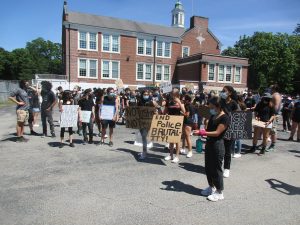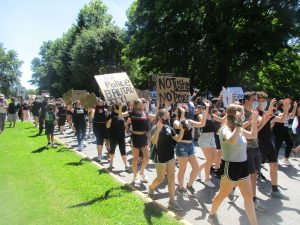How Alumni Pushed Lakeland School District Into Action on Racial Justice
By Madeline Rosenberg

When Lourdes Vivanco graduated from Lakeland High School in 2018, she thought she would say goodbye to her classmates and leave her old school district for good.
But Vivanco is now part of a group of former students leading a racial justice group in the Lakeland community. After the coronavirus pandemic sent Vivanco and her high school peers home from their college campuses in the spring, she watched local school districts respond to calls for racial justice. She wished Lakeland had done more.
“I saw so many college kids around me, kids that I graduated with, that really cared about how their universities were reacting to the murder of George Floyd and protests around the nation, and I was thinking: What has Lakeland done?” Vivanco said in an interview with The Examiner. “What is Lakeland saying or doing to support their students?’”
Vivanco originally wrote those thoughts in an Instagram post, saying she hoped to contact the district and push them to recognize shortcomings and make changes.
A dozen alumni saw the post and joined Vivanco to organize a march in June that drew hundreds of Lakeland students, parents, teachers and community members through Shrub Oak to the district’s administration building. They sent letters to the Board of Education, launched an online petition and circulated a survey to allow students to share their experiences confronting racism in the district.
Now, the more than 50-member coalition, known as Lakeland for Justice, has led the district to consider implementing an anti-racism policy, review the curriculum for bias and representation, and work toward hiring and retaining more teachers of color, Superintendent of Schools Dr. Brendan Lyons announced at the July 1 board meeting, his first day on the job. Trustees said they will review district policies to make explicit that “racism and discrimination in any form will not be tolerated.”
In a community that Vivanco said has failed to address racism and listen to marginalized groups, some quarters resisted the coalition’s demands. But the group is still growing, as Lakeland students and alumni now push for change with a new superintendent at the helm.
Lyons, who was previously Superintendent of Schools in the Arlington School District in Dutchess County, said during the July 1 meeting that he had reviewed the petition and will make anti-racism work his priority.
“If our students, even just one, feel pain as a result of their experience in our schools or feel that they don’t belong, that is simply not OK,” Lyons told the board. “Public education is meant to be the great equalizer, and it can only serve that purpose if all truly means all.”
A more inclusive Lakeland
Lyons’ pledge last month came after weeks of activism. It reflected the petition that the coalition presented to the board in mid-June demanding that the district uplift marginalized communities, develop an anti-racist curriculum and recruit more teachers of color.
“We demand that these national events not be turned into a singular teaching moment about racism in our school community, but rather as a turning point for our district,” the petition reads. “While our community is not at the center of national conflict, it is not yet part of the solution. Racism pervades every facet of our society, and ignoring it does not make it disappear but instead enables unacceptable behavior.”
The petition, which now contains more than 1,200 signatures, also asks trustees to take a more proactive approach to addressing racist behavior. Under the current policy, students must report incidents, but some students are discouraged from doing so because reports are sometimes “brushed off,” said Jhoely Duque, a coalition member and a 2018 Lakeland graduate.
Board of Education President Michael Daly forwarded a request for comment to Lyons, who called many of the demands practical and necessary.
Lyons said his recent conversations with students have highlighted that they haven’t felt comfortable reporting their experiences, and when reports trickled in, administrators likely saw them as isolated incidents. But they were happening regularly.
“I don’t know if the former superintendent or the school board really understood that this wasn’t just one or two things that happened, like an anomaly over the course of the school year,” Lyons told The Examiner. “A lot of the things students talked about were, ‘This happened to me and nobody did anything.’ That ‘these are things we experience over our time at Lakeland.’”
Now, Lyons said he will require the district to report all incidents of bias and discrimination to his office, allowing him to monitor patterns and to send the message that Lakeland won’t tolerate racism. Previously, most of the reports were handled at the school level and rarely forwarded to central office administrators.
Resistance to change

Vivanco said the petition originally developed as a response to former superintendent George Stone’s “brief and vague” statement on national calls for racial justice in June. She said writing the petition revealed that many community members were defensive toward racial issues.
Teachers notified the administration when they heard about the petition, Duque said. Vivanco added that some of her former teachers responded that the experiences of students of color “weren’t real” and didn’t want alumni to “make this an issue.”
Vivanco said other teachers told her that the coalition should make its demands more palatable to the school board. While current and former students overwhelmingly embraced the coalition, she said some students didn’t think the petition was forceful enough.
“It just shows how naive they were about these issues,” Vivanco said of some teachers. “It was very much like ‘I don’t see it and therefore it’s not there.’ There’s just an awareness among certain members of the staff that the community that we’re working with is pretty conservative, pretty fragile around these issues as a whole.”
But others in the community responded positively. Vivanco said some teachers provided support and insight into the school climate, and the June 16 march demonstrated that students aren’t alone in the movement, said Amy Belfer, a 2015 graduate and one of the march organizers. The Lakeland community heard students recall their painful experiences of racism in the district. Duque also read the petition to a crowd that included teachers and administrators.
The march became a catalyst for change, Belfer said. One teacher told Belfer afterward that they had no idea racism was a problem in the district and wanted to learn more. Some parents and teachers have since joined the coalition.
Trustee Robert Mayes, who attended the march and rally, called out the board at the July 1 meeting for staying silent on racism. Mayes encouraged community members to keep pushing the board to take action.
“I wish more of you all could’ve been there to listen to the words that were spoken at this demonstration. They were spoken from the heart and with passion,” Mayes told his colleagues at the meeting. “There were tears.”
Vivanco said the district’s passiveness surprised her. She said she had the impression that speaking out could jeopardize the standing of some faculty and staff. Alumni with younger siblings in the district also weren’t as vocal, Vivanco said, afraid how their siblings’ classmates would respond.
“That’s a really disappointing thing to come from the district,” Vivanco said. “You have your own students afraid to speak up. Teachers claim they are listening to what we’re saying but can’t concretely support anything yet because of what the district might do. I wasn’t expecting a lot of people district-wide to fear talking about these things.”
But Vivanco said she, too, feared talking about her high school experiences.
Black students currently comprise 6 percent of the district student body while Latino students account for 22 percent, according to the most recent data. The demographics mean “that it’s kind of easy to dismiss” students of color, Vivanco said.
She said finding communities in college that encouraged her to be vocal about issues of race empowered her to speak up about racism within her former school district. She had never imagined doing the same in high school.
“It was really emphasized to me that if I wanted to be successful at school and in general, this was kind of a thing that I had to overlook,” Vivanco said. “My mom was aware of that, so she was like ‘Don’t over-involve yourself in stuff like this. You just have to keep pushing through and you’ll be out in four years.’”
New leadership, new hope
Vivanco is hopeful that future Lakeland students will be able to openly talk about their identities. Lyons said he is meeting with students and alumni, including coalition members, who submitted letters to the school board. Vivanco said she left her meeting with Lyons believing that he’s committed to addressing the group’s concerns. Duque called his response to their demands personal and heartfelt.
“He can set a new impression and new energy for this school district, one that really encourages teachers to speak out and to talk about these issues,” Vivanco said. “I think that’s the revitalization that Lakeland needs.”
The newly-appointed superintendent said he is committed to making concrete changes for the fall, in addition to longer-term steps such as reviewing the curriculum and having greater diversity among faculty. He also plans to increase training for district staff and create a district-wide equity committee of about 30 staff members, students and parents who would continue addressing issues surrounding diversity and inclusion.
“I’m hoping by the fall people are going to see some real, tangible action,” Lyons said. “Obviously people felt that in the past enough wasn’t done. Whether that’s true or not, it doesn’t matter. Let’s make sure people feel heard and make sure people feel that we’re taking tangible steps to address these issues.”
After months of advocating for a more inclusive school district, Vivanco said she feels more connected to the district that she never expected to return to.
“I kind of have this mindset where I’ll leave Lakeland and never come back. Now it’s kind of like, I know there are people in this community that want the same things that I do and want the community to be better,” Vivanco said. “People have been so helpful and so positive and they make me feel really good, like I belong in this community.”

Examiner Media – Keeping you informed with professionally-reported local news, features, and sports coverage.
